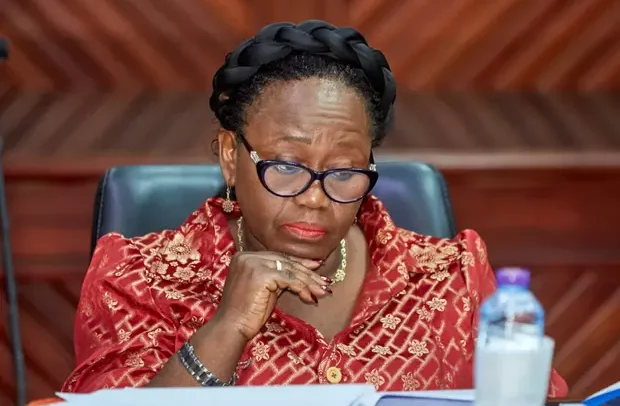Justice Gertrude Torkornoo
The Supreme Court (SC), in a unanimous decision, yesterday dismissed an application for interlocutory injunction filed by the suspended Chief Justice Gertrude Torkornoo, which sought to halt the committee set up by the President to inquire into the three petitions against her.
The five-member panel presided over by the Acting Chief Justice Paul Baffoe-Bonnie and assisted by Justices Issifu Omoro Tanko Amadu, Yonny Kulendi, Henry Anthony Kwofie, and Richard Adjei-Frimpong, said there was no merit in the application for injunction and dismissed it.
The court said its full reasons for the dismissal would be made available on June 12, 2025.
The court earlier struck out a supplementary affidavit filed by Justice Torkornoo pointing out some unfair treatments meted out to her and her lawyer by the committee, and what she described as mockery of justice, considering the manner in which the committee’s enquiry was being conducted.
The court was of the opinion that the depositions in the supplementary affidavit were proceedings that happened before the committee, and the constitution per Article 146(8) demands that the proceedings must be in-camera.
The court also dismissed an objection by the Attorney General challenging the decision to add the five members of the committee – Justices Gabriel Scott Pwamang, Samuel Adibu-Asiedu, Daniel Yao Domelevo, Major Flora Bazaanura Dalugo and Prof. James Sefah Dzisah, to the suit and injunction filed by Justice Torkornoo.
Suit
The suspended Chief Justice has filed a suit at the Supreme Court challenging her suspension and the setting up of the committee of enquiry to probe three petitions calling for her removal.
She followed it up with an interlocutory application to restrain the committee from proceeding to probe the allegations made against her as well as an order to restrain Justices Gabriel Scott Pwamang from chairing the committee and Justice Samuel Adibu-Asiedu acting as a member of the committee.
Chief among Justice Torkornoo’s complaint before the court is the fact that she has not been given the prima facie determination by the Council of State in consultation with the President, which led to the setting up of the committee and her suspension.
She avers that aside the April 22, 2025 statement issued by the Secretary to the President, she has not been given anything relating to the said prima facie determination to afford her an opportunity to know the allegations on which prima facie determination was made, to enable her mount a defence.
Injunction Motion
Moving the motion, former Attorney General, Godfred Yeboah Dame argued that the court will note that proceedings of the committee have begun yet no proper prima facie case so-called has been presented to Justice Torkornoo.
He said prima facie determination is a quasi-judicial determination, an evaluation of the petition presented to the President, so, the requirement of prima facie case is not a mere formality but a substantive constitutional requirement which also confers constitutional right in the Chief Justice.
Mr. Dame further argued that the rules of natural justice require that the Chief Justice is told at least which of the allegations contained in the petitions resulted in the prima facie case against her and which of them satisfy the test in article 146.
In respect of the relief sought against Justice Pwamang and Asiedu, he said Justice Pwamang and Justice Torkornoo sat on two of the matters which form part of the petitions filed by two of the petitioners, hence he cannot be part of the committee that determines the petitions.
Mr. Dame disclosed that one of the petitioners has even listed Justice Pwamang as a witness to his case, only for the President to appoint him on the committee to hear the case.
He also contended that Justice Asiedu had sat on a panel challenging the article 146 process, and the case was adjourned a number of times, hence he could not be part of the committee.
Opposition
The application was opposed by Deputy Attorney General, Dr. Justice Srem-Sai, who argued that the application had no merit and that it did not meet the standard of determining whether interlocutory injunction should be granted in a public interest matter.
He added that the court had already ruled on the matter of prima facie determination and held that it is not sufficient ground for granting an interlocutory injunction.
The panel, after examining the process and oral submissions of both counsels, dismissed the application for lacking merit.
BY Gibril Abdul Razak


